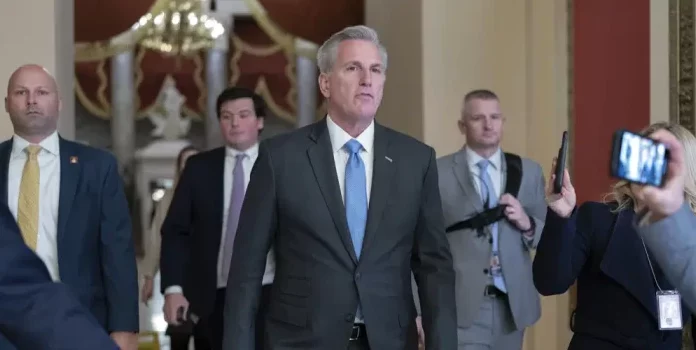(By Brett Rowland, The Center Square) U.S. House Republicans passed a bill Thursday in response to the surge in illegal immigration at the nation’s southern border during President Joe Biden’s tenure. The measure was voted on just as Title 42 enforcement was set to expire at midnight.
“Mr. President, thank God Republicans are in charge today,” House Speaker Kevin McCarthy said Thursday before Republicans adopted the bill.
Republicans have blamed Biden for the surge in illegal immigration at the U.S.-Mexico border that has led to overcrowded shelters, crossing deaths, human and drug trafficking, increased homelessness, a spike in fentanyl overdoses and poisonings, and other issues.
The measure passed 219-213 just hours before Title 42, the emergency health authority that allowed U.S. officials to turn away migrants at the U.S.-Mexico border to prevent the spread of COVID-19, expires.
Biden has vowed to veto the bill if it reaches his desk.
The bill, H.R. 2, known as the Secure the Border Act of 2023, would restrict the Department of Homeland Security from providing parole to foreign nationals by defining the reasons for which parole may be granted. Parole allows people to temporarily enter the United States. It would also require all employers to use E-Verify, a federal system that allows public- and private-sector employers to confirm work eligibility in the U.S. Use of E-Verify would be phased in over several years.
The bill would also re-start construction of a southwestern border wall. It would require the Department of Homeland Security to build at least 900 miles of wall and physical barriers at an estimated cost of $1 billion from 2024 to 2028 and an additional $1 billion after 2028.
It would also direct U.S. Customs and Border Protection to hire enough border patrol agents to maintain staffing at 22,000. That would mean the U.S. Customs and Border Protection would have to add about 3,000 agents at an estimated cost of $1.3 billion from 2024 to 2028.
The Congressional Budget Office said the bill would increase unified budget deficits by $6.1 billion over the next decade. That deficit consists of a $45.4 billion decrease in on-budget deficits and a $51.5 billion increase in off-budget deficits, according to the CBO report. But that does not account for the potential decrease in costs to local and state governments for providing food, shelter, schooling, health care and other services.
The measure – if approved by the Democratic-controlled Senate and signed by Biden, both of which are unlikely – would likely spur changes in wage reporting and tax withholding once all employers are required to use E-Verify and reduce the use of federal benefits by foreign nationals. The CBO also said it would reduce costs for the Office of Refugee Resettlement after reductions in caseloads. However, the CBO highlighted two areas of significant uncertainty including the “extent to which the government would detain arriving aliens or return them to the contiguous country from which they arrived” and if people “without legal work authorization would continue to work and whether and how they would pay taxes.”
Republicans pushed for the passage of the bill. They said it would secure the border, stem illegal immigration and reduce human and drug trafficking at the border.
Democrats called the measure cruel, punitive, unworkable and dead on arrival in the Senate. They also said it would hurt farms and other agricultural businesses.
“Mandatory E-Verify would decimate the agriculture industry,” U.S. Rep. Jarrold Nadler, D-New York, said on the House floor.
During debate on the bill, Republicans blamed Democrats for the problems at the border and Democrats blamed Republicans.
U.S. Rep. Laurel Lee, R-Fla., said “when we fail to secure our border, cartels will.” Texas Gov. Greg Abbott, whose state has the longest border with Mexico, said the cartels already control the Mexican border and has declared them foreign terrorist organizations.
U.S. Rep. Veronica Escobar, D-Texas, said the measure would “make things much worse” at the border. She said it was not a serious bill.
“These are the things that should keep Americans awake at night,” U.S. Rep Barry Moore, R-Ala., said of fentanyl trafficking at the U.S.-Mexico border. “… A closed border is a compassionate border.”
U.S. Rep. Steven McCaul, R-Texas, called the situation at the border “the largest human trafficking crisis I have witnessed in my lifetime.”
Biden has indicated he would veto the bill should it get to him.
“The Biden-Harris Administration’s approach to border management is grounded in this strategy – expanding legal pathways while increasing consequences for illegal pathways, which helps maintain safe, orderly and humane border processing,” Biden’s office said in a statement of administrative policy.
“However, the Administration is limited in what it can achieve by an outdated statutory framework and inadequate resources, particularly in this time of unprecedented global movement. H.R. 2 does nothing to address the root causes of migration, reduces humanitarian protections, and restricts lawful pathways, which are critical alternatives to unlawful entry.”

